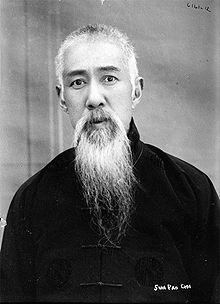Sun Baoqi
| Sun Baoqi 孫寶琦 |
|
|---|---|
 |
|
| Premier of the Republic of China | |
|
In office 12 February 1914 – 1 May 1914 |
|
| Preceded by | Xiong Xiling |
| Succeeded by | Xu Shichang |
| Personal details | |
| Born |
April 26, 1867 Hangzhou, Zhejiang, Qing, China |
| Died | February 3, 1931 (aged 63) Shanghai, Republic of China |
Sun Baoqi (simplified Chinese: 孙宝琦; traditional Chinese: 孫寶琦; pinyin: Sūn Bǎoqí; Wade–Giles: Sun Pao-ch´i; 26 April 1867 – 3 February 1931) was a government official, foreign minister, and premier of the Republic of China. His courtesy name was Mu-han (慕韓)
Sun was born in Hangzhou, Zhejiang Province in 1867, the eldest son of Sun Yijing, assistant Imperial tutor to the Xianfeng Emperor of the Qing Dynasty. He received a classical Chinese education and was awarded the title of second grade yinsheng. He then married a relative of Yikuang, the future Prince Qing. In 1886, Sun became a junior secretary of the Board of Punishments, a post he held until 1895. He was listed for assignment to a foreign post in 1898, but his appointment was delayed because of the Boxer Rebellion. In 1902, he briefly served as secretary of legation in Vienna, Berlin, and Paris, was then appointed Minister to France. Sun returned to China in 1906 and became chief secretary of the Grand Council, which was tasked with reorganizing the country's administrative system. In 1907, he became Minister to Germany. In January 1909, Sun was appointed assistant director of the Tianjin-Pukou railroad, and in June of that year he was appointed governor of Shandong Province. Sun was a supporter of constitutional government for China. In 1910, he urged the imperial authorities that a cabinet system be established, and in 1911 he recognized the independence of Shandong from Manchu rule. However, after Yuan Shikai secured power, Sun was forced to retract this declaration and resign.
...
Wikipedia
